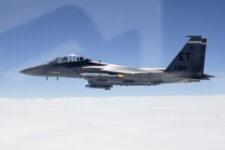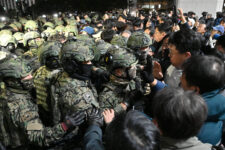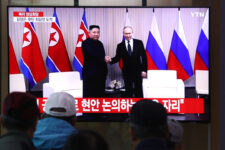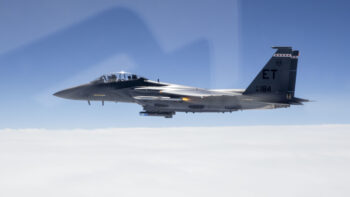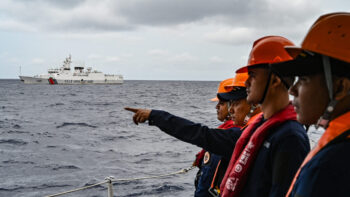 WASHINGTON: A “recently signed” Defense Intelligence Strategy prioritizes countering Russian and Chinese disinformation, including providing more timely information to Combatant Commanders to support their efforts, says Neill Tipton, director for Defense Intelligence, Collection and Special Programs.
WASHINGTON: A “recently signed” Defense Intelligence Strategy prioritizes countering Russian and Chinese disinformation, including providing more timely information to Combatant Commanders to support their efforts, says Neill Tipton, director for Defense Intelligence, Collection and Special Programs.
Further, he told the House Armed Services subcommittee on intelligence and special operations, DoD and the IC plan to complete an effort to declassify information about adversary information-warfare activities by September in order to bolster the military’s ability to respond.
“Adversary use of disinformation, misinformation and propaganda poses one of today’s greatest challenges to the United States, not just to the Department of Defense,” said Chris Maier, acting assistant defense secretary for special operations and low intensity conflict, at the hearing. “Russia and China, as well as non-state actors, understand that in today’s information environment, they have real time access to a global audience that with first mover advantage, and by flooding the information environment with deliberately manipulated information that is mostly truthful with carefully crafted deceptive elements, these actors can gain leverage to threaten our interests.”
Maeir noted that it was important to remember that, as stressed in President Joe Biden’s new Interim National Security Strategic Guidance, DoD’s first priority in countering adversary disinformation is “elevating diplomacy as our tool of first resort” through supporting the State Department public diplomacy teams, and its Global Engagement Center.
“Within DoD, we organize our efforts to combat disinformation misinformation and propaganda in four broad lines of effort, all supported by a foundation of intelligence support, interagency collaboration and partnerships,” he explained. “These four areas are: countering propaganda by adversaries; force protection; countering disinformation and strategic deception abroad by adversaries; and deterring and disrupting adversarial malign influence capabilities.”
The last time the Defense Intelligence Strategy was updated (at least in the public domain) was in 2008. A DoD spokesperson said today that the new version of the strategy was signed on Aug. 25, 2020 and is classified.
“The strategy calls out a specific action to prioritize intelligence support to strategic competition and influence efforts,” Tipton elaborated. “The Defense Intelligence Enterprise will help advance us influence and counter coercive campaigns via robust and focused intelligence support to sensitive and special activities, influence, deception, and, more broadly speaking, operations in the information environment.”
In particular, he noted, the Office of the Undersecretary of Defense for Intelligence (OUSDI&S) is actively providing “intelligence support” to “irregular warfare” and “operations in the information environment,” as well as “intelligence dissemination to support Combatant Command messaging and counter activities.”
Indeed, the new strategy is, in part, an answer to a memo — which Tipton said is known informally as the “36 Stars Memo” — from nine combatant commanders begging more assistance from the Intelligence Community in fighting back against Russian and Chinese influence operations, including those aimed at US military personnel. The memo was signed Jan. 15, 2020, a DoD spokesperson told Breaking D today, but was never released to the public.
“A memo signed last year by nine Combatant Commanders drives home just how important this issue is,” said Republican Rep. Trent Kelly in his opening statement to the hearing. “Recognizing the need for increased support from the Intelligence Community to combat this threat, they note malicious efforts by Russian and China across the information domain to seed discontent, weaken trust, and undermine alliances. The threat is real and growing.”
In that memo, the commanders also pushed hard for the authority to disclose malicious activities by Beijing and Moscow in order to better be able to respond and create counter-narratives.
DoD has heard that plea, Tipton said, and is partnering with the Intelligence Community “in an ongoing effort to streamline processes for downgrading, declassifying and disclosing intelligence in support of operations in the information environment. We look to complete current efforts in response to that memo by September of this year, while continuing following initiatives to increase the use of open source intelligence, and to determine policy and resourcing strategies to provide the most effective intel support to OIE [operations in the information environment] going forward.”
To implement the various efforts, DoD has set up a new “Defense Intelligence Support to Operations in the Information Environment” working group, Tipton said, which is working with the Office of the Director of National Intelligence (ODNI) to “focus the National Intelligence Community on collection efforts in assisting us in the conduct of influence-related activities against key adversaries.”
That working group also is drafting a new “DoD Instruction” that will include specific recommendations on how ODNI is to do that, he added. Those recommendations are based on a 2019 memo from the Joint Requirements Oversight Council (JROC), he said.
State approves $3.64B sale to Japan of air-to-air missiles
The possible sale of the RTX-made AMRAAMs includes up to 1,200 missiles.
